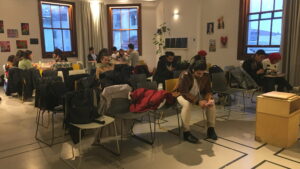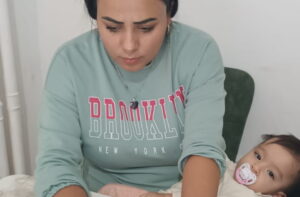By Somaia Valizadeh
Parwana Ibrahimkhel Najrabi lives in Stuttgart today. A 23-year-old woman is leading a protest with a group of Afghan women’s rights defenders to tell the international community about the Taliban’s Gender Apartheid Politics.
Her information is first-hand. Najrabi was detained for 27 days by the Taliban. After experiencing extreme violence and abuse, she is shocked by the lack of justice for women as victims of gender-based violence.
The Fall of Kabul and the Rise of the Women’s movement
On January 22, 2022, the United Nations had expressed concern over the disappearance of two young women rights defenders, Tamana Zaryab Paryani and Parwana Ibrahimkhel Najrabi. The young women impressed with their courageous marches on the streets of Kabul together with others in the weeks prior. They were chanting “Bread, Work, Freedom”, the primary motto of the women’s rights movement in Afghanistan today.

A couple of months ago, the Taliban had seized power in Afghanistan on August 15th, 2021. Parwana Ibrahimkhel Najrabi was doing Media work for different ministries and was engaged in defending women’s rights. Together with several other women rights activists and civil society actors, they had met at the Kabul Continental Hotel. Najrabi was delivering a speech when she heard that the Taliban had arrived in Kabul. Upon receiving this information, a significant number of participants departed from the program rushing and with a sense of concern. But a few remained and decided to continue their work.

Sometimes later, when the Taliban’s demands and restrictions in various fields, especially those affecting women, began to intensify, Parwana and a group of her friends decided to make their voices heard. They marched through the streets chanting slogans such as, “ Woman, Life, Freedom,” the slogan of the Iranian women’s movement, and “Bread, Work, Freedom,” the slogan of the Afghan women’s movement.
Haunted by violence: abuse in the Taliban’s prison
Parwana Najrabi’s childhood was overshadowed with sad losses. Her father was killed by the Taliban 14 years ago because he worked at the National Security Directorate in Herat province as a security force. Her brother was blinded in a suicide attack in 2013. Her family and even acquaintances had cautioned her to refrain from engaging in political activities on the streets.
In January 2022, Parwana went to the hospital with her mother and sister to get checked up. Upon their return, the Taliban stopped the car. They took Ibrahimkhel away with her sister’s husband. Both of them were violently forced out of the car, and the young woman was slapped in the face.
She recollects, “They blindfolded us and transported us to a location that I am still uncertain of today. Only men were in that place. They were beating us and treating us badly. When I wasn’t beaten, I would hear the screams of the other prisoners. Men and women were held together in that awful place.”

The sanitary conditions were unfavorable, and Parwana was not provided with any sanitary items during her period. She says, “These guys didn’t even know what a woman’s menstruation was. And they claim that women are guarded by women in their prisons. There was not a single woman present, and the men were systematically torturing us.
The advocate for women’s rights spent almost a month behind bars in Afghanistan, from the midst of January to February 11, 2022, while being held captive by the Taliban. Najrabi thinks that international organizations and women’s street protests have saved her from being stoned by the Taliban.
Bribes to the Taliban are not a solution
She emphasizes that the Taliban granted her release in exchange for receiving a substantial amount of money from international and human rights institutions, as well as obtaining a guarantee. But she doesn’t name these institutions or say how much money the Taliban got.
Her concern today is that the international community cannot deny these heinous acts and violations against human rights, especially women’s rights, committed by the Taliban.
“At present, European nations are engaged in negotiations with representatives of the Taliban,” she utters with a tone of rage. “I want them to know, whom they’re talking to”.
The Taliban want to silence women who are fighting for justice, and they also try to get money from international organizations in exchange for releasing women who are in jail, according to the Afghan women’s rights movement. Maryam Karimi, a human rights defender and former member of the Afghan Human Rights Commission living in the Netherlands today, says that the Taliban repress those who want justice and continue to ask human rights organizations for money to release the protesting women. “Instead of extorting bribes, international organizations should intensify their political pressure on the Taliban to end the systematic violence against women”, she emphasizes.

Parwana Ibrahimkhel Najrabi lives in Germany, but she is in Kabul with her mind and soul. She envisions an Afghanistan without crimes against humanity, equality, and progress. “The Taliban regime has turned Afghanistan into a hellhole for women and girls since the democratic system in Afghanistan collapsed.”
According to reports from human rights organizations, Manizha Sediqi, Julia Parsi, and Neda Parwani are human rights activists and women’s rights advocates who were detained and held by the Taliban in the past two months.
Parwana Ibrahimkhel Najrabi vows to fight the Talibans’ misogynistic regime in Afghanistan also from Germany and will not give up on tackling any obstacle to protect the rights of Afghan women.


